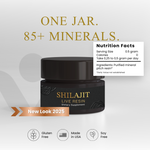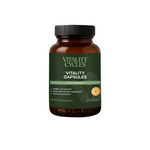Why Treating your Hypertension May Not be a Good Strategy
Why Treating your Hypertension May Not be a Good Strategy
Introduction
(0:01 - 0:27)
Hi, this is Sunday, January 12th, 2020! Yay! My name is Dr. Daniels, and you are listening to Healing with Dr. Daniels. This is your show that hopefully gives you some solutions, helps put your mind at ease, and helps you be healthier, happier, and live easier.
Turpentine and Sugar
(0:27 - 1:58)
And of course, we're going to start our day off, or our podcast off, with some turpentine and sugar. And you guys know, the sugar is, yay! White cane sugar, yes. We're just going to take a little spin, and this is the tropics, so sugar cakes up in the tropics. I have my favorite little pipette; you can get these on Amazon. I keep my turpentine on my desk, like so. Those of you who live in a house with someone else might want to keep it in a bottle, sealed, and labeled. Alright, squeeze this, upsy-daisy. I like my dose, which is half a teaspoon for me, if it works. Put this on here, yum, yum, yum, yum, yum. And just put a whole half teaspoon on, yep. Notice it does not soak all of the sugar—that is correct. We have our glass of water, nice and handy. I like to put a little bit of water in my mouth first to get it off the spoon really quick, and down the hatch. We have a little bit of water left. That went down pretty easy. If you can get it to go straight down the center, not touch any of your teeth, then yay. That is the best experience. It's just as effective either way; it's just more pleasant that way.
Shilajit
(2:07 - 2:42)
Then we have Shilajit, yay, Shilajit! Let's open this up. Ah, yeah. Tari and gooey, straight from Russia. Ooh, nice, nice and soft. The topic is very hot, so this is nice and soft and gooey. We put it in the water, as you can see, stir it up, nothing much happens. We're going to let it sit for a while, and we will drink it later.
Today's Topic: Hypertension and Heart Disease
(2:42 - 3:07)
Okay, so of course that brings me to today's topic, which is why treating hypertension may not be a good strategy for heart disease. To protect you from heart disease, why it might not be a good strategy. And what to do instead, right? So, what I'm going to take a look at today is evidence from the medical industrial complex itself. I don't do research; there's enough already done out there. People say, "Oh, we need more research." I'm like, "Have you looked?" There's more research out there to support abandoning the medical industrial complex for any and all of your health care needs.
Hypertension Treatment Analysis
(3:07 - 4:33)
So today, we're just going to look at treating hypertensive therapy. Let's take a look at treating hypertension, and we will look at other risk factors as well. Hypertension, especially in blacks, right? Everyone's heard of it; I have. I was taught in medical school that blacks have a higher risk of heart disease than whites. So, let's see what the deal is.
This is from Medscape. I love Medscape. This is from October 23rd, 2019. Medscape is a database that is compiled and internationally sends emails to licensed doctors who prescribe drugs, who practice western medicine, letting them know what's going on and updating stuff just so they can keep up with the standard of care. Their headline is, "One third of cardiovascular disease in U.S. blacks is linked to hypertension." Whoa, whoa, whoa, back up, back up. Did you catch that? One third? For our mathematical skills, let's take that 33%, one third, and round it to 30%. So, that means that 70% of heart disease in blacks is not related to hypertension.
The Ineffectiveness of Hypertension Treatment
(4:33 - 6:08)
Which means that if hypertension in blacks were eradicated tomorrow—magic—then only one third of heart disease would be wiped out. The other 70%, or 67%, we'll call it 70%, would still be there unchanged. So really, you're going to take four drugs, see the doctor every three months, get your arm stabbed to check for side effects, which might be deadly, just to lower your risk by one third.
Alright. So, it's one thing to have something be statistically significant, meaning it shows scientifically this is indeed the case. But then you have something called, as a practicality, is it clinically significant? In other words, does it really make a friggin' difference to the person sitting in front of you that their chance of disease, let's call it, drops from 6.5% to, let's see what we have here. 6.5% is supposedly what it is in blacks. By the way, this is not statistically even significantly different from what it is in whites, but let's just go with that.
Questioning the Value of Hypertension Treatment
(6:08 - 7:03)
So, does it matter that it goes from 6.5% down to 4.3%? Or more precisely, does it matter that your chances of not having heart disease go from 93% to 95%? Probably not going to make a difference in the scheme of things. So here, what they confess, without really realizing it, just off the bat, is that treating hypertension as a strategy for blacks to reduce heart disease, or eliminate it, is simply not a worthwhile venture.
Medscape's Findings on Hypertension
(7:03 - 8:09)
And so they go on, and they devote quite a bit of space to this. Let's see, well, two pages, which for them is a lot. One third of heart disease cases in the United States black population are associated with hypertension, new research shows. Our data support focused efforts to diagnose and treat hypertension in black individuals, and even more importantly, attempting to prevent the development of hypertension in the first place with lifestyle modifications.
Evaluating the Impact of Hypertension Treatment
(8:09 - 9:02)
Well, alarm right here. So you have a condition that is at best going to afflict 6% of the population, and you're going to subject 100% of the population to intervention that is going to benefit at most 2% of the population. You hearing me? This is looking like a seriously bad investment. That would be like asking 100 people to buy and pay for a gallon of gas, and only two of those 100—we don't know which two—are going to benefit by receiving a gallon of gas. Most people would get out of that line. Yes, that is the treat my hypertension line.
Population Attributable Risk and Cardiovascular Disease
(9:02 - 10:09)
The authors set out to establish the population attributable risk of cardiovascular disease associated with hypertension in black individuals. They wanted to figure out, so blacks have hypertension, and they have heart disease risk. Of that risk, what percent is due to hypertension? They said that this number, if they could ever figure it out, can be used to inform—that means to create and justify—policy, that means government intervention, and prioritize—that means determine who gets the money—public health interventions by identifying modifiable—that means things that can be changed—risk factors that can have the greatest association with reducing disease risk.
The Nuance of Disease Risk vs. Death Risk
(10:09 - 10:23)
Now, here's another thing. There's disease risk, then there's the risk of death. And this is a very important nuance. In other words, if you have a disease, and that disease is associated with a risk of death, you can actually decrease the frequency of that disease, but not decrease the actual death rate.
Conclusion
(10:23 - 10:25)
So, what they're doing, as far as the unwary reader is concerned, is focusing on something other than what might be the bottom line for the patient, which is, "Am I going to live longer?"


